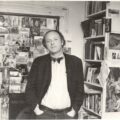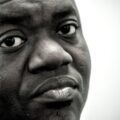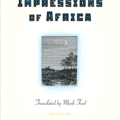Conversations: Krysten Hill and Ruby Rose Fox

Sometimes, I stand awkwardly in kitchens at house parties, leaning over cheese spreads and imagining myself saying smarter things to strangers. It was at a house show like this that I met musician and songwriter, Ruby Rose Fox. Years later, I was granted another opportunity to sit down with Fox and catch up after the release of her debut album, Domestic, and my chapbook, How Her Spirit Got Out.
Both projects are concerned with translating the complexities of women’s experiences in settings of violence, grief, and also reclaiming. Anyone who has seen Fox’s performances knows that along with her haunting vocal style and fierce persona on stage, there is also a powerful poetic storyteller. When all these things come together they create a vehicle for emotions and honest narratives about women.
As a poet who also understands the value of performance, I too am concerned with how the anatomy of a poem communicates the music of the line while highlighting the necessity of sharing of women’s stories, especially that of the women in my family. Because I found ways into selfhood in these places in the stories of the women around me, my work became an extension—a way of reaching for them and making them visible. In our conversation during the spring of 2017, we explored the importance of acknowledging our obsessions as artists working in different mediums and how they become ways into investigation and meditation for social issues that deserve space and voice.
—Krysten Hill
ALSO: Watch Krysten’s performance at Greater Boston Writers Resist. –DEP, ed.
Krysten Hill: Do you think that people get offended by the sound of your voice? I know that’s a weird question to start with, but at the last reading I was at someone came up to me and said that I sounded so angry when I was reading poetry.
Ruby Rose Fox: I don’t know. No one has ever said that outright, but I can imagine that my voice doesn’t sound like people think that I should sound. It’s not high. What I mean is it’s not what they think of as feminine. That kind of power could be threatening to a dude. So, I guess I’m not surprised in some ways.

Krysten Hill (photo credit: Jon Beckley)
KH: Has anyone ever come up to you after a show and communicated this?
RRF: They did a lot when I was young, and they’d try to tell me how to sing. They’d be like you should sing like this. They don’t do it anymore because I think they’re scared of me.
(Laughter)
KH: Sometimes, during shows I get reactions to my performances, and I think a lot of it is what I write about and the command of my voice. One thing someone has said to me after a show was, “Do you write any happy poems? Do you have any happiness in your life? Maybe write about poem about being thankful.” He felt compelled to give me a writing prompt. What that came off to me as was “Why can’t you write a certain way or perform a certain way to make me feel comfortable?” It took me a long time performing in public to realize that’s bullshit. It took me a long time to be comfortable with the ways my voice came out of me vocally and on the page. It took me a long time to understand that I don’t owe anyone my happiness in my writing or in my own life. I was thinking at the time, “Why do you think I owe you any specific emotional response or any specific narrative?”
RRF: It’s funny. I think the persona that has naturally evolved into what is Ruby Rose Fox is scary to some men, and they don’t approach me. That’s great because I don’t really want to hear from them anyways unless they had something amazing to say to me.
KH: I’ve experienced gas-lighting situations with men who are intimidated by social issues concerning women in my work. They’ll come up to me on some “not all men” stuff or they’ll try to shape the narrative of my work in a way that I’m not comfortable with. I was at a show last week, and someone comes up to me, and says something to me like, “What was it like growing up and being so disadvantaged?” I felt like he was making a lot of assumptions and misreadings about who I am as a black woman, and what I’d just said on stage in a way that made me question my own art. Maybe I gave my audience a lot of poems about grief, but that doesn’t mean that my whole experience is that, and it was funny that this person thought of the narrator’s experiences with grief as disadvantaged. It was unreal to me that after I gave him an answer like “Actually, a lot of these poems are about how the black women in my life are strong and are survivors, and he kind of hesitantly nodded, and walked away as if I wasn’t giving him the right answer.
RRF: Yeah, I was just in the Midwest playing protest songs for women who voted for Trump. And I was really shut down halfway through our tour, emotionally on stage. I mean I gave it my best. It wasn’t until the equipment wasn’t working in Indianapolis and I just shut down and said, “I’m done. Let’s just let the headliner go on. I was just feeling intense emotion. And we sat down for a meal afterwards, and we started just talking it out. I realized that I really felt out of my political bubble and I felt really upset. So, every show after that, I started speaking specifically to my material. And that kind of freed me to say my statement without feeling in a crazy place where I wondered who was in the audience. And then I realized that I didn’t need them to believe in anything.
KH: I think as a writer too, I’ve felt like racism and misogyny has always been a part of our society but I was telling a friend over dinner how as a performer sometimes, now, I worry about how much energy I have because of all the emotional energy that goes into my work and how much it takes to be a black woman in this world. It takes a lot to get up in front of people and say those difficult things. Sometimes, I don’t think that people realize that an artist can be up on stage really depressed and struggling internally about the things that they are giving the audience. I worry about what’s going to happen because of things that I am saying. As a black woman, I worry about getting heckled. I worry about getting harassed after a show especially in spaces that I don’t know what their responses are going to be.
I wrote some notes while revisiting your album, Domestic, and I especially responded to “Jordan River” that wasn’t on this album where you thoughtfully wrote about Jordan Davis. What kind of reception have you been getting from it?
RRF: Yeah. Mostly, I’ve been surprised by the radio silence from it. I was really terrified about putting that out in the world because I felt really vulnerable writing about a black experience as a white person. But, I was totally open and I ready for people to talk to me about how I navigated that. I just felt like it came from a really genuine place and it came from my own sister dying, and watching my mother grieve her whole life. I felt so connected to the narrative and to the pain and suffering of the families who are then left behind to grieve their entire lives. I had just written an album called Domestic, so I was thinking a lot about families and what happens inside living rooms, not what’s on the news. I was ready for people to come back at me in that constructive way, and I didn’t get a lot of response. So, I didn’t totally get an answer to some of my uncomfortable feelings.
KH: What were some of those uncomfortable feelings as a white artist commenting on a murder that was so racially motivated?
RRF: Being a perfect ally is impossible. I want to contribute to moving forward, and I want to support the dream that I have for the future of this country. I guess, I’m in a place where I’m willing to fuck it up, and I’m willing to hear anyone tell me their feelings.
KH: Too often I feel like artists think that it’s about neat answers to the things we are dealing with. And I think it’s sometimes about working things out gradually and the questions and discovery of it, and that’s messy. You do have to put yourself out there in terms of criticism, but also to what you might learn from the responses that people might have to your art.
I don’t think you were assuming the black experience. I was looking at the lyrics, and some of the lyrics that I really liked talked about the idea of how quick the media moves on from stories like Jordan Davis, and for me, there is no “moving on” from these losses. The reason I got off Facebook for a bit was because I couldn’t take the constant exploitation of black death on social media. People were posing death videos or Michael Brown in the street or even the car that Davis was in.
RRF: The thing is how unbearably slow the grief process can be and it doesn’t match up to the fast pace of the media. I didn’t lose a child but I watched my mom lose a child slowly and so long, and it affects everything and everyone that person reaches. And I think about how many lives were transformed from this one death, this unnecessary death, and that’s what was really getting to me–the permanence of it, but then the seemingly impermanence of the coming and going of news stories.
KH: I’m glad that this made it into your song and into your lyrics. I think that is something it important. There are a lot of reasons why that song is political, but your acknowledgement of the revolving door of grief-driven narratives in the media as if these aren’t real people is important.
This is one the first times we’ve gotten to sit down and talk to each other about the themes in our work that overlap. I talk about the complicated nature of grief. Your work is also really honest about women’s experiences. When I was telling the story about my great-grandmother who was sexually assaulted, I struggled with putting that story in the chapbook because I wanted to respect her experience.
RRF: Ruby Rose Fox was my grandmother’s name, and she was mentally ill her whole life. I guess I can frame that as many things, in that it could be looked at as exploitation and it could also be seen as a way of me surviving my own trauma. What’s funny is that when I think about you telling that story in your chapbook, I don’t just assume it’s true. I assume it’s how you are processing her and the story, and that’s what is beautiful and fascinated me about your individual processing of the narrative, and not the scientific narrative of what actually happened.
KH: And you make a lot of artistic choices when you’re telling a story. Sometimes, you do have the benefit of characters and narrators that don’t have to be you, but as an artist creating a narrative while knowing the history that was challenging. Honestly, I didn’t spend a lot of time with my great-grandmother. I was told this story, and people never talked about it openly. And that trauma in a sense, even though I’m adopted, I’ve felt and lived similar experiences with men. I think it’s weird to see the echoes of brutality from my great-grandmother’s life in my own. And we never got to talk about this together.
RRF: The echoes of brutality is a great way to frame it in that it’s sort of like being told I’m “crazy” by ex-boyfriends who don’t want to deal with the truth of my feelings. Those are the same guys who fifty years ago would’ve locked me away. And you just see your life as not the same, but there is something that is still there. For me, we did the music video for “Bury the Body” in this house, and we turned the living room into a mental ward, and it was weird using art to recreate this hypothetical scenario of Rosemary Kennedy, but secretly I knew it was really about my grandmother. I put myself through an electroshock scene and I thought, “Why am I doing this?” It was like I had to try to understand it on the level that I was willing to understand. I don’t think everyone needs to understand their family trauma that in-depth, but I did for some reason, and I’m not haunted by it anymore. Whereas, I definitely felt ashamed and weird and creeped out by the whole narrative before I let myself artistically explore it on the level that I did.
KH: Yeah, you’re right. Something does happen when you process it and almost enter the space of someone you love or maybe didn’t get the opportunity to love the way you wanted to.
RRF: The hopeful thing here is that I’ve had multiple people tell me that the music makes them feel less ashamed, and I think that is what I’m trying to do for myself. And if that is what the result is, I’m okay with it.
KH: And in an interview, someone said that Domestic felt quite literary to them. I was wondering how this translated to you and what it means to you?
RRF: Because of my training in theatre, I think of songs as scenes. So you enter and exit the scene. And it’s not me, but it’s an entirely different world of different characters and different rules and different voices.
KH: That’s interesting. When you’re performing, do you feel like there are different voices and different personas in different songs?
RRF: Yeah! They show up and it’s super weird.
KH: What does that feel like?
RRF: I don’t know, I mean it just comes out. It just happens. Sometimes, if you’re scared to emotionally commit to something, you can create a false voice. So, I have to be careful and think, is this a false voice, or is that a character trying to come through? I have to be real with myself about if I’m just trying to put something on to mask the story or the feeling. That actually happens a lot in the writing process for me. I just believe in the multiplicity of self. So, I just believe there are like a thousand people inside of me, and I just let whoever wants to speak, speak.
KH: What is that voice that comes through?
RRF: That answer could be a whole new album. I don’t know about you, but when I’m in the middle of the writing process, I don’t always want to answer that question. Sometimes you don’t want to know until you get something written. You don’t want to shut it down.
KH: I agree. I don’t even want to acknowledge who I’m speaking to in a poem or who is speaking to me until it’s written.
RRF: So, can I ask you about what your writing process looks like when you sit down?
KH: I feel like my process feels like—I was telling my students this—that I feel you enter the stages of grief. Sometimes, there’s like this denial at first, there’s like this panic and anger, and then there’s this point of acceptance that comes with a draft. I spend a lot of time avoiding what needs to be done because I know what that immersion is going to be like.
RRF: Well, maybe you’re just describing the death of the self—the death of the ego in service of something else. I totally know what that feels like. Yesterday, I was in my studio trying to write, and I just got obsessed with the idea of a sandwich even though I wasn’t hungry. I knew if I just stuck there for another hour, something was going to come through that made sense. And after I did, I said I’m glad I stayed in the room, but at the time, everything in me wanted to get the hell out of there.
KH: Sometimes, I don’t know what my brain is trying to run from. It can just be an obsession with a line that you think is really bad or an object, but the fact that you become obsessed with it says that you need to sit down and spend some time with it.
RRF: I really struggle to start on paper. It’s often with a word or phrase or a song. For me, lyrics and melody come together and they so rarely come from a line without music. It comes through in sound and through melody. For example, yesterday, I just had a line that was working and I went with it, and wondered what’s the next thing to say. I’m not like a person who cuts and pastes music together. It’s like a flow and it’s like a discovery so by the end of the song or by the end of chorus I learn what the song is about, but I won’t know what it’s about before I start writing. I think that was inspired by people like Harold Pinter, the playwright. That when language emerged from the actor’s voice it felt like it was being discovered in the moment. That’s why I really love Leonard Cohen because I’m always surprised, and I feel like he was surprised by his discoveries.
KH: It’s interesting to me too, that part of your writing process involves getting to know your favorite artists’ own processes. I think that sometimes, it not just enough to read, look, or listen to them. It’s good to investigate how they do things and their routines.
RRF: Maybe I’m just obsessed with Leonard Cohen.
KH: Love your obsessions. I think about that a lot because sometimes my obsessions are not even people. Sometimes, it’s just a color. Recently I’ve been wondering why the color yellow comes up so much in my work. Why are the kitchens in my poems yellow? Does it matter? Is my brain is trying to work something out? Writers can have yellow kitchens and it doesn’t mean anything, but I watch for those repetitions. Outside of my work, I’ll find myself surrounded by the color yellow on accident. So, I wonder why am I even putting myself in a physical space of color. It goes beyond just liking the color. It’s something the color is trying to talk to me about.
RRF: As an artist, you find yourself going through these insane bouts of investigations, and it can be really cool. It becomes almost like this murder mystery. It feels like this revolution that your psyche is wrapped up in and sometimes through looking and through the writing process it becomes clearer and clearer as your mind revolves around it. The human brain is amazing.
Just speaking what you created is going to make a persona in the eyes of persona. It can be a crazy feedback loop of energy. This creation of the persona can just be the act of opening your mouth.
KH: Your lyrics and your voice are always copacetic. I know when I’m having an off performance as a poet when I can acknowledge myself speaking.
RRF: And then you have to stop and recommit. Sometimes, I’ll notice that when I’m singing with the band, and I’ll have to stop myself, and refocus. I’ll tell myself to come back and commit to the narrative. When I work with students on presence, I tell them it’s like surfing. It’s a negotiation with yourself. It’s not that you either have a stage presence of your don’t. It’s a constant negotiation on whether you want to open to your audience or you don’t. It’s a go and return. It’s like the ocean. I think a lot of performers panic when they think they lost it, and they psyche themselves out, and they’ll just check out for the rest of the performance. It’s good to remember as a performer that you can just refocus, and take a moment to step out and step back in. There are a million reasons why you might fall off of a horse during a live performance. There are a million things coming at you.
Ruby Rose Fox, a vocal powerhouse of soul-driven, edgy rock ‘n’ roll (with a nod to new wave pop), whose voice threatens to knock down the walls of any room in which she performs. In 2017, Ruby was named “Best Singer Songwriter” at The Boston Music Awards, “Best Musician” but Redline Roots, and “Album Of The Year” at The New England Music Awards. The Boston Herald describes Ruby Rose Fox
Krysten Hill is an educator, writer, and performer who has showcased her poetry on stage at The Massachusetts Poetry Festival, Blacksmith House, Cantab Lounge, Merrimack College, U35 Reading Series, and many others. She received her MFA in poetry from UMass Boston where she currently teaches. Her work can be found in apt, Word Riot, The Baltimore Review, B O D Y, Muzzle, PANK, Winter Tangerine Review and elsewhere. She is the recipient of the 2016 St. Botolph Club Foundation Emerging Artist Award. Her chapbook, How Her Spirit Got Out, is now available through Aforementioned Productions.





